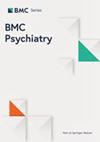中国患者健康问卷-4的纵向测量不变性和心理测量学特性
IF 3.4
2区 医学
Q2 PSYCHIATRY
引用次数: 0
摘要
医学生中的抑郁和焦虑症状往往令人担忧。患者健康问卷-4(Patient Health Questionnaire-Four,PHQ-4)是一种重要的抑郁和焦虑筛查工具,它常用且易于使用。本研究旨在评估和更新简体中文版PHQ-4的纵向测量不变性和心理测量学特性。研究使用 PHQ-4 对医学生进行了三波纵向调查。结构效度基于单因素、双因素和二阶因素模型,建构效度基于自评健康问卷(SRHQ)、睡眠质量问卷(SQQ)和罗森伯格自尊量表(RSES),纵向测量不变量(LMI)、内部一致性和重测信度基于三个时间点的结构一致性。确认性因素分析的结果表明,双因素模型的拟合效果最佳,三个时间点的 LMI 均得到支持。PHQ-4的因子间相关性、因子总相关性和结构效度均可接受。此外,Cronbach's alpha、McDonald's omega 和类内相关系数均显示 PHQ-4 的可靠性为可接受/中等至优秀。本研究提供了新的纵向证据,证明中文版 PHQ-4 具有良好的 LMI 和心理测量特性。这些数据为将PHQ-4用于中国医学生抑郁和焦虑的常规筛查和扩大使用范围提供了信心。本文章由计算机程序翻译,如有差异,请以英文原文为准。
Longitudinal measurement invariance and psychometric properties of the Patient Health Questionnaire-Four in China
Depression and anxiety symptoms among medical students are often a concern. The Patient Health Questionnaire-Four (PHQ-4), an important tool for depression and anxiety screening, is commonly used and easy to administer. This study aimed to assess and update the longitudinal measurement invariance and psychometric properties of the simplified Chinese version. A three-wave longitudinal survey was conducted among healthcare students using the PHQ-4. Structural validity was based on one-factor, two-factor, and second-order factor models, construct validity was based on the Self-Rated Health Questionnaire (SRHQ), Sleep Quality Questionnaire (SQQ), and Rosenberg Self-Esteem Scale (RSES), and longitudinal measurement invariance (LMI), internal consistency, and test–retest reliability were based on structural consistency across three time points. The results of the confirmatory factor analysis indicated that two-factor model was the best fit, and LMI was supported at three time points. Inter-factor, factor-total, and construct validity correlations of the PHQ-4 were acceptable. Additionally, Cronbach’s alpha, McDonald’s omega, and the intraclass correlation coefficient demonstrated acceptable/moderate to excellent reliability of the PHQ-4. This study adds new longitudinal evidence that the Chinese version of the PHQ-4 has promising LMI and psychometric properties. Such data lends confidence to the routine and the expanded use of the PHQ-4 for routine screening of depression and anxiety in Chinese healthcare students.
求助全文
通过发布文献求助,成功后即可免费获取论文全文。
去求助
来源期刊

BMC Psychiatry
医学-精神病学
CiteScore
5.90
自引率
4.50%
发文量
716
审稿时长
3-6 weeks
期刊介绍:
BMC Psychiatry is an open access, peer-reviewed journal that considers articles on all aspects of the prevention, diagnosis and management of psychiatric disorders, as well as related molecular genetics, pathophysiology, and epidemiology.
 求助内容:
求助内容: 应助结果提醒方式:
应助结果提醒方式:


